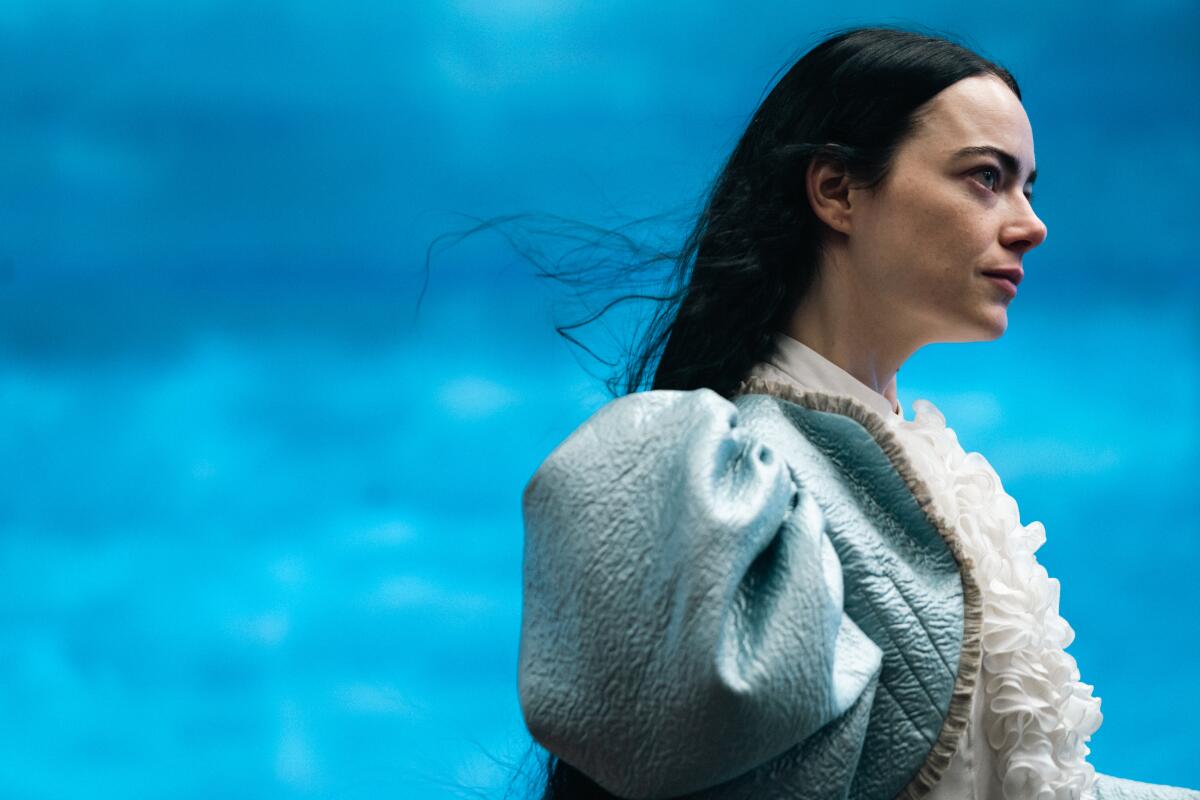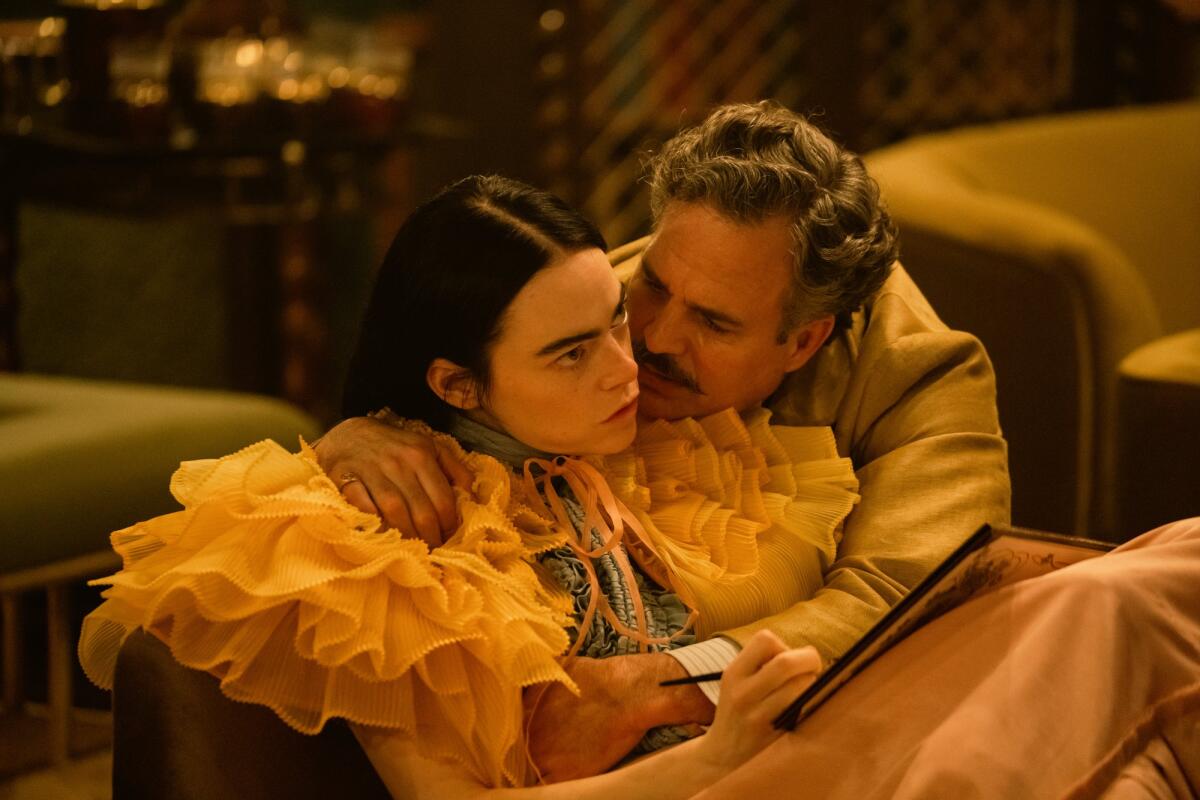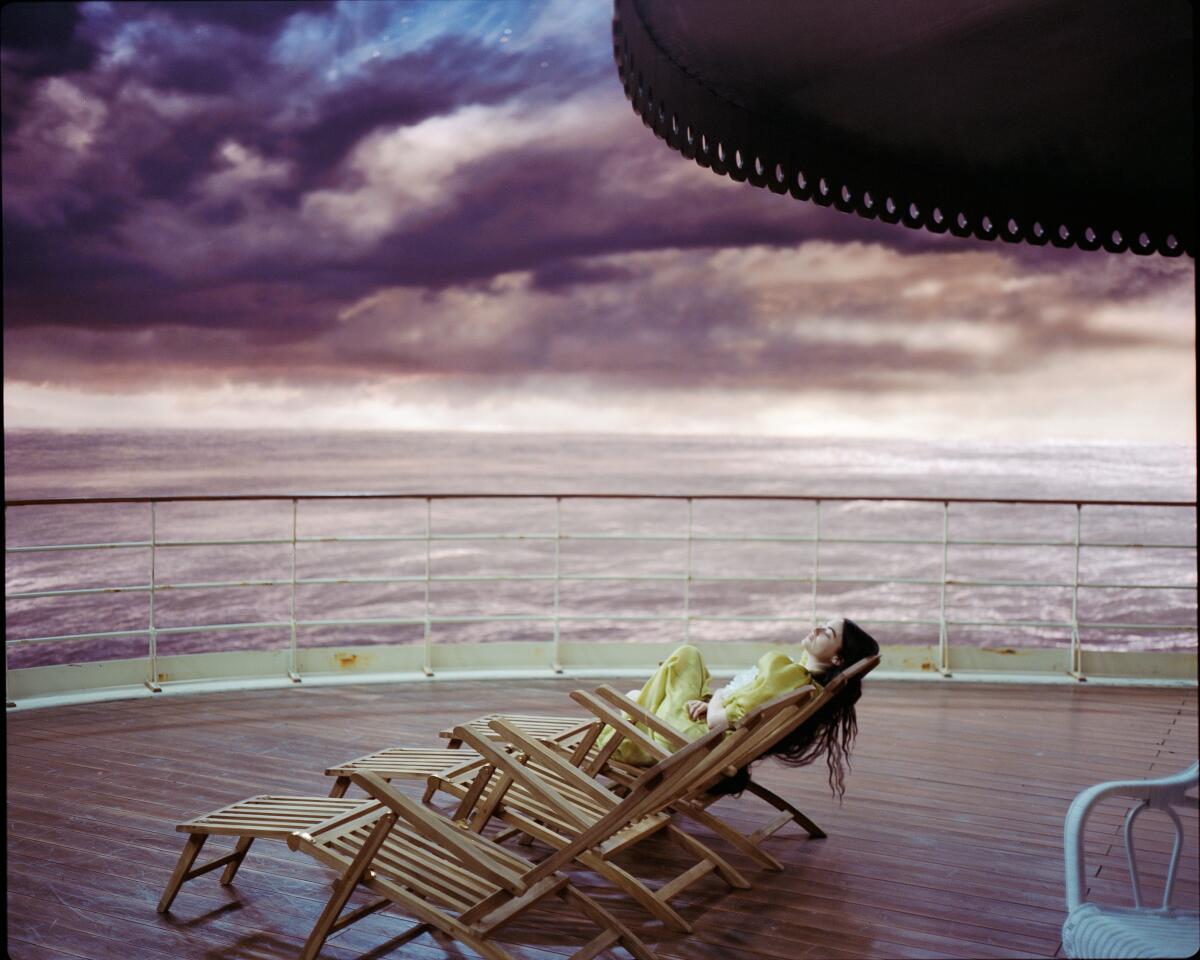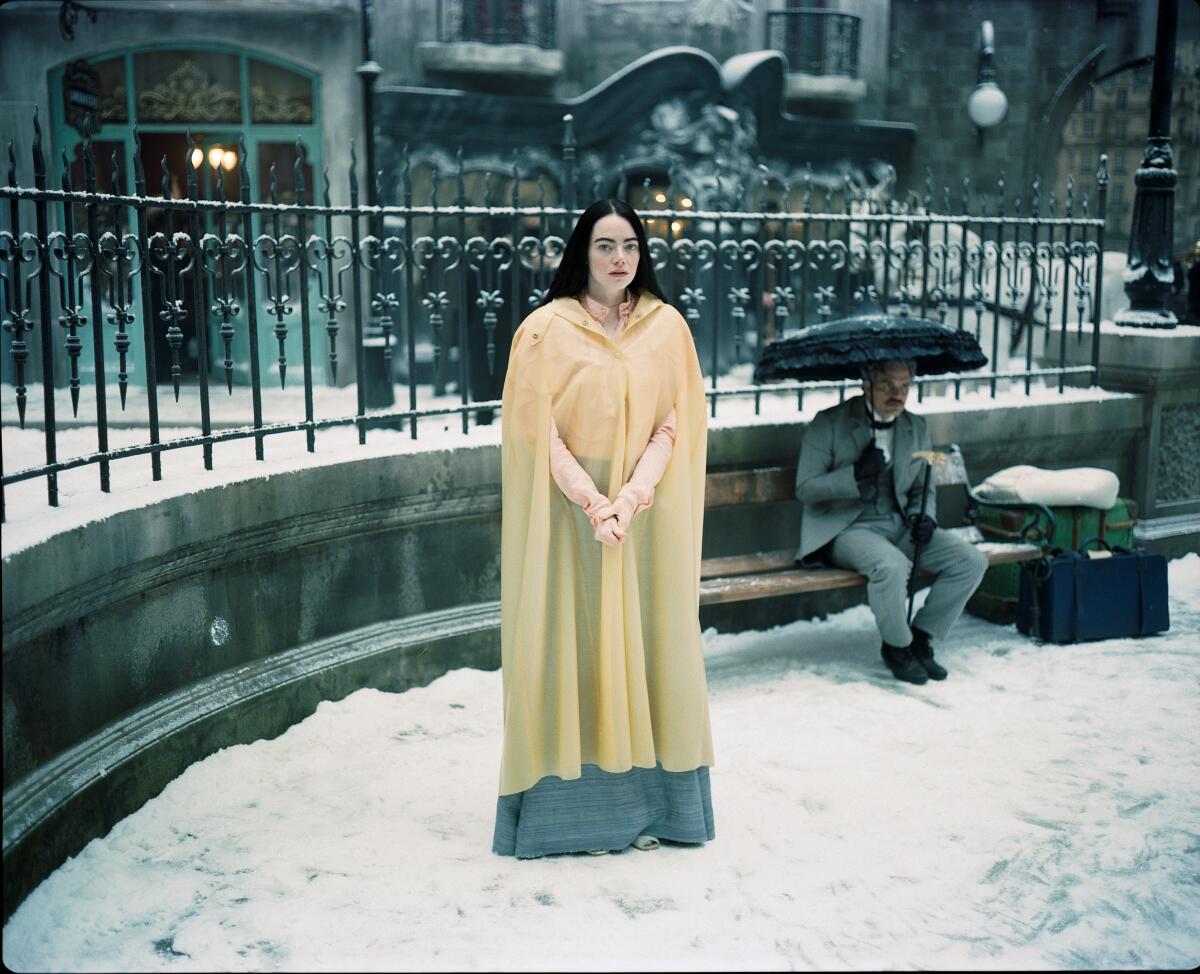Review: ‘Poor Things’ is Emma Stone and director Yorgos Lanthimos’ richest work to date

- Share via
There comes a moment when “Poor Things,” a gloriously bonkers fairy tale from the director Yorgos Lanthimos, explodes from black-and-white into wild, ecstatic color. Bella Baxter — played by a grinning, gasping, rutting, entirely astounding Emma Stone — is having sex for the first time, and it’s an experience of purest Technicolorgasmic delirium. The abrupt shift in visual palette naturally evokes “The Wizard of Oz,” even if the circumstances decidedly do not: Think of it as the R-rated art-house equivalent of Dorothy opening the door to Oz for the first time, though this particular Dorothy might as well be singing her own bizarre riff on “If I Only Had a Brain.”
Bella, as we learn early on, is the beneficiary of the world’s first mother-daughter cranial transplant, a procedure performed by a sweetly deranged, unsubtly named scientist, Dr. Godwin Baxter. (He’s played by Willem Dafoe, emoting beautifully through a faceful of prosthetic scars.) The reasons for this operation are too elaborate and nonsensical to give away here; suffice to say that, with the slash of a scalpel, a sizzle of electricity and a heavy debt to Mary Shelley, Bella now has a baby’s brain and a dead woman’s reanimated body — a mismatch that Stone conveys with her stumbling gait, underdeveloped speech and a look of childlike anarchy in her sharp, searching eyes. Bella is her own mother and her own daughter, which is to say she’s both and she’s neither. She’s a monstrosity and a marvel, and no less than the movie that spawned her, she’s entirely sui generis.
Indeed, to a remarkably thorough degree, Bella is the movie. It’s not just that Stone’s droll, playful, ferocious and febrile performance dominates almost every scene, or that the severity of Bella’s countenance, with her piercing blue eyes, pale complexion and dark, Rapunzel-length hair, stays with you for days afterward. It’s more that the movie around Bella, brilliantly adapted by Tony McNamara from Alasdair Gray’s 1992 novel, feels like such a singular and unfiltered expression of her consciousness. Lanthimos may have cobbled together a rambunctious psychosexual odyssey from many Frankensteinian parts — a little “Alice in Wonderland,” a dash of “Metropolis,” a soupçon of Voltaire by way of the Marquis de Sade — but he and his skilled collaborators have marshaled them into a remarkably coherent and purposeful vision.

Shona Heath and James Price’s elaborate production design, plopping down a candy-colored futuristic theme park on various corners of 19th century Europe, captures the otherworldly strangeness of what Bella sees. Robbie Ryan’s 35mm cinematography, deploying irises, fish-eye lenses and exploratory tracking shots, suggests the disorientation and curiosity with which she sees it. Holly Waddington’s costumes, mashing together periods and styles, approximate the anything-but-seamless jumble of Bella’s identities, as does her suggestive deployment of fleshy-looking folds and ruffles.
And Jerskin Fendrix’s unruly, dissonant score, working in context with Johnnie Burn’s womblike soundscape, plays like something piped in directly from Bella’s transplanted psyche. In a way, Fendrix’s compositions — moving from the wry, picaresque strings of Bella’s early years to a convulsive coming-of-age synth-ony — tell the story as directly as any of McNamara’s words.
Even so, those words provide their own wickedly funny music, especially when spoken in Stone’s signature rasp (no more mistakable for the British accent she employs here, as she did in Lanthimos’ “The Favourite”). When we first meet Bella in Victorian London, she’s barely verbal, prone to communicating by smacking, punching and flinging food at people. Taking most of the abuse is Godwin’s devoted young assistant, Max McCandles (Ramy Youssef), who observes Bella and soon becomes hopelessly smitten with her. He becomes more enamored still as Bella’s brain development accelerates to keep pace with her body, a strain we hear reflected in her inventively circuitous, concussed-Jane-Austen-heroine syntax: “Your sad face makes me discover angry feelings for you.” “The cruel just bubbles up in me.” “Now, I must lie down and you must lie down on top of me and do more furious jumping.”

That last phrase is one of several carnal euphemisms sprinkled throughout McNamara’s bracingly lewd, profanity-laced script. Bella becomes a veritable thesaurus of filth from the moment she discovers sexual pleasure, first exploring her adult body with childlike curiosity and then embarking on a passionate fling with a dandyish ne’er-do-well named Duncan Wedderburn (a hilariously lascivious Mark Ruffalo). It’s Duncan who spirits her away, taking her on a decadent tour of Lisbon and then on a European boat cruise, all the while urging Bella to gorge herself on pastries, oysters and his own all-too-eager body. How old is Bella, mentally, when the frenzied Kama Sutra montages kick in? It’s troublingly difficult to say. In Lanthimos’ world, transgressive sex scenes — plus sadistic power games, anachronistic dance numbers and senseless acts of animal cruelty — more or less come with the terrain.
The sex scenes between Bella and Duncan — and between Bella and the various partners she takes during an extended Parisian jaunt — may occupy only a few of the movie’s 141 minutes, but they have unsurprisingly dominated the buzz around “Poor Things” since it premiered (and won the top prize) at the Venice International Film Festival this past fall. The disproportionate attention certainly proves one of the movie’s points, namely that sex can be fun (“Why do people not do this all the time?” Bella marvels) and also, for that reason, a dangerously all-consuming distraction.
But Lanthimos, who favors a dryly clinical view of human relations, isn’t (only) interested in art-house titillation. Even when he fills the screen with whips and chains, bared breasts and pendulous phalluses, the overriding atmosphere is one of absurdity rather than ecstasy. And Bella, who’s inherited a measure of Godwin’s analytical detachment, registers enough of that absurdity to move decisively past it — to question what, if anything, the world has to offer beyond indulgences like rich sweets, fabulous clothes and bursts of erotic release. Bella’s body may draw the camera’s gaze, but the evolution of her mind and the awakening of her conscience is this movie’s chief preoccupation and, finally, its most meaningful source of beauty.

She starts asking questions, reading Emerson and forging friendships, notably with two fellow travelers who challenge her assumptions and encourage her liberation. (They’re played by an amusingly unctuous Jerrod Carmichael and, in the movie’s most delightful casting non sequitur, the veteran German actress Hanna Schygulla.) As her horizons expand, Bella learns about the existence of pain and suffering, cynicism and compassion, the problems of socialism and the horrors of capitalism. Mostly, too, she learns that men are awful, with Ruffalo’s jealous, petulant Duncan serving as an obvious Exhibit A, while a hyper-authoritarian general played by Christopher Abbott serves as Exhibits B through Z. Even Godwin and Max, relatively benign overseers whose fondness for Bella is never in doubt, make their attempts to subjugate her — perhaps Godwin most of all, insofar as he brings Bella into being through an act of violence against a woman’s body.
If Godwin would defend his actions on scientific grounds, it’s a choice that unmistakably aligns him with Lanthimos, who has long approached his characters in the manner of a researcher conducting an elaborate psychosocial experiment. That’s why “The Favourite” behaved less like a gussied-up English period drama than a rigorous, semi-sadistic case study in aristocratic misbehavior, and why “The Lobster” imposed such blatantly allegorical rules on its sendup of socially proscribed monogamy. “Dogtooth,” an early Lanthimos tour de force that this movie seems strikingly in conversation with, was a closely observed study of entrapment that ended with a possibly futile gesture of liberation.
In “Poor Things,” liberation sets in gratifyingly early, and Lanthimos follows it through to its strange, thrilling, not-at-all-logical conclusion. Whether this makes the movie an innately feminist work or, as some detractors have claimed, a superficial girlboss narrative is certainly open to debate. One might just as easily read the movie as a kind of secular Nude Testament parable, with Bella cast as Godwin’s prodigal daughter — or as a family-unfriendly companion work to “Barbie,” in which a woman’s doll-like naiveté becomes a surprisingly effective weapon against the patriarchy. It takes a child’s untainted vision and uncoached honesty to call out the stupidity of the existing social order, just as it also takes a woman’s strength to do something about it. Or, as Bella herself puts it with a mix of childish whimsy and grown-up wisdom: “It is only the way it is until we discover the new way it is.”

Even so, Lanthimos and Stone shrewdly sidestep any lone interpretation by making Bella too interesting — too impulsive, too thoughtful, too cruel, too kind and finally too damn hilarious — to be reduced to an easy symbol of female empowerment or an avatar of post-#MeToo resistance. (“A woman plotting her course to freedom — how delightful,” a character mutters with unmistakable meta-sarcasm.) It’s become a cliché to praise a filmmaker for loving his characters, as if doing so made said characters worthier of our interest, or if humanism were an inherent artistic virtue. But Lanthimos clearly loves Bella Baxter to pieces, which is why he refuses to flatten her comic dimensions or sell her out: The fact that she’s as unnervingly, unpredictably funny by movie’s end as she is at the beginning is proof of just how seriously he takes her.
Bella isn’t the first person in a Lanthimos movie to hunger for freedom and experience (in a way, they all do), but there’s something remarkable about the way her sense of liberation merges with the director’s own. I think that’s why “Poor Things” feels as exuberant as it does, why a movie with so much unadulterated weirdness, so many patently unnecessary surgical procedures and vivisectional sight gags, is also its director’s most joyously unbound work. Its heart is forever in the right place, even when its brains are not.
'Poor Things'
Rating: R, for strong and pervasive sexual content, graphic nudity, disturbing material, gore and language
Running time: 2 hours, 21 minutes
Playing: Starts Friday at AMC Burbank 16; AMC Burbank Town Center 6; AMC the Grove 14; AMC Century City 15
More to Read
Only good movies
Get the Indie Focus newsletter, Mark Olsen's weekly guide to the world of cinema.
You may occasionally receive promotional content from the Los Angeles Times.











